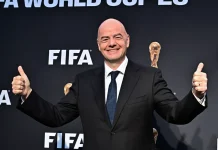The 2026 FIFA world cup, which will be jointly hosted by the United States, Canada, and Mexico will be the largest world cup of all times. There is however, increasing criticism of the FIFA ticketing model, especially its use of a randomized lottery system and dynamic pricing model.
Critics believe that these mechanisms make the sport less accessible to fans and support exclusivity at the cost of global inclusivity, one of the long-standing values of the sport. The initial implementation of the sale of tickets in 2025 already revealed the fundamental structural and moral issues of equality, accessibility, and the prioritization of business over the grassroots football soul.
The layered complexities of ticket access
On September 10, 2025, FIFA launched the first major ticketing round of the 2026 tournament, a Visa-exclusive presale lottery. The fans have to sign their names within a given time, and then their eligibility to buy is decided by a randomized draw. Those selected receive time slots in October to secure tickets—but only within categories and availability predetermined by FIFA.
This layered process removes agency from consumers, replacing direct purchasing with a system dependent on chance, brand affiliation, and financial flexibility. Unlike past tournaments, where early and transparent purchasing windows allowed planning, this system introduces artificial scarcity and limited transparency in ticket allocation.
Visa exclusivity and digital gatekeeping
The fact that FIFA partnered with Visa alone means that only users of Visa cards can access the presale, leaving millions of prospective purchasers who prefer other payment options behind. This also tends to disproportionately impact fans in markets where Visa market penetration is poor or digital networks are patchy, exacerbating an already disjointed system.
Although this is meant to be a marketing fit, the exclusivity creates a question of commercial interests taking precedence over fair access. These circumstances enhance the views that fan participation takes a back seat to sponsorship delivery.
Dynamic pricing and economic stratification
The way FIFA has introduced dynamic pricing to the world cup is a radical change in its business model. Group stage match prices start at $60 but could climb to more than $6,700 on premium seats in subsequent rounds including the final. The prices will be dynamic depending on demand, inventory and estimated market value–similar to airline seat pricing or hotel reservations during the peak season.
This framework is the antithesis of the historical pricing model which tried to strike a balance between exclusivity and access. Having implemented a free-market format, FIFA predisposes pricing instability, which automatically affects low-income fans, in particular, those who want to be present at star matches.
Limited financial predictability for fans
The dynamic system also denies the fans the right to plan on a financial basis. Registration is not fixed in price and even if someone wins the ticket lottery, he or she might have to pay prices that are way above their means. This uncertainty disrupts logistical planning of travel and accommodation and de-motivates fans to make the effort to attend.
Furthermore, the fact that dynamic pricing is much closer to profitability than participation equity reinforces the belief that the World Cup is losing its essence as a global event, and more as luxury.
Fan experience and structural inequities
The automated system used in the ticket lottery does not ensure adjacent seating, not even in the same purchase group. To families, to a friend group, to a club of fellow-supporters, this restriction discredits the shared experience which is the core of football culture. There is no assured grouping of seats, which adds another dimension of dissatisfaction, and further dilutes the feeling of community FIFA boasts of promoting.
This is particularly strong among international fans who make huge financial and logistical investments. The lack of coordination in the problem of ticket distribution can be mapped to the lack of coordination in the problems of attending the match, lodging and transportation with a net effect on accessibility.
Travel and accommodation risks
Having ticket consequences as random and pricing as a flowing river, the fan is left to roll dice on planning. It becomes risky to book any flights or hotels without the guarantee of access to the tickets and ultimate pricing. The reason is that it is highly costly and even discouraging to go to this piece meal nature to the world advocates, particularly those who may be limited to the visa and those who will be compelled to travel long distances.
Poor and inefficient ticketing calendar also compromises relationships with the local host cities, most of which base upcoming accommodation, transport, and security facilities planning on the information about early planning decisions.
Revenue control and ethical concerns
Unlike events where revenue is partially shared among host countries or organizing federations, FIFA will retain all ticket proceeds for the 2026 World Cup. With over 5 million tickets expected to be sold, this creates a massive windfall under conditions that many view as increasingly exploitative.
The retention of all revenue combined with an unpredictable sales model underscores a broader debate: should global cultural institutions be permitted to prioritize profitability in ways that risk marginalizing their core constituencies?
Growing backlash from civil society and fans
Fan groups and advocacy organizations have raised alarms about the ethics of FIFA’s approach. Social media has played a central role in voicing discontent, with criticism focused on perceived profiteering and disregard for fan loyalty.
This sentiment was captured succinctly by sports journalist Henry Bushnell, who commented:
“FIFA’s ticketing system risks turning the World Cup into a privilege for the few, undermining decades of football culture built on accessibility and shared passion.”
https://x.com/HenryBushnell/status/1963275556192911535
A shifting model of global sports governance
FIFA’s 2026 ticketing strategy aligns with a broader trend across global sports commercial intensification at the expense of inclusivity. The growing similarity to the pricing structures of the private sector shifts football closer to entertainment sectors, where entry is graded and participation depends on income.
This business rationale is on a collision course with the universal spirit of the World Cup, which, in past manifestations, has played a universal role available to all classes, regions, and backgrounds. Monetizing access via dynamic systems leads FIFA to risk its own irrelevance in the cultural long term.
Questions of transparency and accountability
The demand to increase the transparency of FIFA in its ticketing procedures can be seen as a reply to the question of transparency. Dynamic pricing processes tend to be opaque and consumers may not be able to discern how and why prices change. The fact that FIFA was not controlled and was allowed to make very broad decisions concerning money and operations only increases the amount of perceived exclusivity and mismanagement.
With organised cities spending millions of dollars on infrastructure and services in order to host matches, there is an increasing anticipation that not only should FIFA have a means to commercialise its benefits but also provide some tangible local community and supporter benefits.
These fears will probably increase with future stages of ticket sales as more fans will have to work with a system that starts to look more like a lottery with no promises. As the 2026 World Cup draws closer, FIFA’s ability or failure to course-correct on accessibility will influence not only attendance figures but the legacy of what is meant to be the world’s most democratic sporting event.













